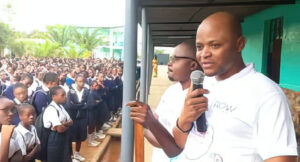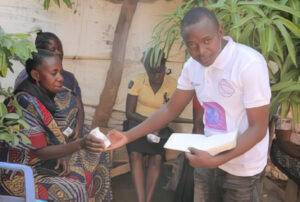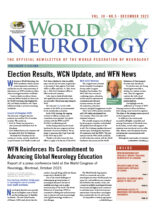by Dr. Prince Kazadi, Dr. Moise Lubendo, Dr. Daniel Tshiyuk, and Dr. Nazaire Kimponto
 The ASLEK Epilepsy Association in the Democratic Republic of Congo (DRC) is the unique national non-profit organization in the DRC, working in the field of research, staff training, community education, and patient care in neurology in general and epileptology specifically since 2008.
The ASLEK Epilepsy Association in the Democratic Republic of Congo (DRC) is the unique national non-profit organization in the DRC, working in the field of research, staff training, community education, and patient care in neurology in general and epileptology specifically since 2008.
ASLEK take cares of 2,500 patients suffering with epilepsy in the DRC, of whom 1,002 patients have at least one psychiatric entity (anxiety, depression, etc.)
The DRC currently has about 105 million inhabitants. With a minimum prevalence of epilepsy of 1%, or 1,050,000 patients, suffering with epilepsy whose total number of neurologists is 10.
Our areas of action:
- Epilepsy education
- Epilepsy management
- Epilepsy research
- Medical training
- Social support
 Epilepsy Education
Epilepsy Education
Aslek Epilepsy in DRC organizes awareness campaigns in the community, schools, churches, and public squares to combat the stigma and social discrimination suffered by people suffering from epilepsy in the DRC.
Management of Epilepsy
ASLEK had the privilege of being among the associations supported in Africa by ROW Foundation; we received after six months, a supply of drugs, allowing us to cover the care of 74 patients eligible for levetiracetam and 26 patients eligible for lamotrigine and other patients receive medicines from members’ contributions.
We work with TeleEEG UK, a non-profit organization helping resource-limited countries without many neurologists like the DRC, with EEG interpretations and we also work in collaboration with the Federal University of Rio de Janeiro in Brazil, which supports us with interpretations of EEGs from rural areas of the DRC.
We are working on the implementation of IGAP in the DRC.
Research on Epilepsy in the DRC
ASLEK works in epilepsy research in the DRC in collaboration with University College London (UCL) for studying the impact of inbreeding on the risk of genetic disorders in three local communities in the DRC.
This perspective is the most unique and has shown a desire to study genetic susceptibility that can potentially explain the high incidence and prevalence of epilepsy in communities with high consanguineous marriage rates. These factors have not yet been explored in resource-limited country contexts due to the very high cost of genetic sequencing, as well as the absence of a laboratory, and much more emphasis has been placed on parasitic diseases associated with seizures.
ASLEK is also involved in research on the study of early detection of cognitive degeneration in collaboration with Neurosteer.
Medical Training
The Democratic Republic of Congo currently has only 10 neurologists for 105 million inhabitants and all of them are in the country’s large cities, and there are no neurologists in rural areas.
This lack of neurologists in the Democratic Republic of Congo remains a major challenge to overcome because it is the basis of erroneous diagnoses and inadequate care.
ASLEK Epilepsy in DRC is the only non-governmental organization training doctors and nurses in rural areas of the DRC on epilepsy, with a view to improving the management of epilepsy through the use of a smartphone which generates a summary to share with neurologists around the world for remote therapeutic guidance (telemedicine) with some challenges related to the internet connection for sharing data from rural areas of the DRC.
There is great interest in training primary doctors in neurology in the DRC through the granting of comprehensive training scholarships.
Social Plans
Epilepsy is considered in several regions of the DRC as a contagious disease. This makes this pathology more stigmatized in the DRC, thus making the lives of people suffering with it very difficult and even unlivable, leading some patients to commit suicide and adopt a life of isolation as a means of defense.
ASLEK Epilepsy in DRC thus fights against the stigmatization of epilepsy in schools, while using students as a bridge to convey the message to parents, churches and public awareness campaigns.
We train and inform the Congolese community about epilepsy by promoting sketches and videos on local and national television channels, referring to the slogan of our association which says epilepsy is not contagious.
In addition to awareness campaigns against stigma and social discrimination, ASLEK, within the limits of its means, also provides material support in kind and in cash to children suffering from epilepsy, most of whom come from very poor families and live with less than one American dollar per day.
Challenges
Challenges we face include the following:
- Medical staff
- The remarkable deficit of personnel specialized in neurology.
- Lack of infrastructure, including lack of clinics specialized in epilepsy ; added to this, is a problem with medical equipment, a notable deficiency in EEG, CT, and MRI for the causal diagnosis of certain forms of epilepsy, and the absence of biochemical laboratories drug deficiencies and the high costs of drugs available on the DRC market such as sodium valproate, levetiracetam, topiramate, etc.
- Many patients do not accept the diagnosis for fear of stigmatization, social discrimination and rejection, barrier to marriage among young women, lack of cooperatives for food self-sufficiency, problem of social reintegration, and the abandonment medication due to lack of food.
Conclusion
Epilepsy is a treatable neurological condition; however, in resource-limited countries this pathology still remains a heavy burden.
This being said, in this fight, we at ASLEK Epilepsy are seeking partnerships with other international organizations to meet these significant challenges. •
Dr. Prince Kazadi is the director of ASLEK Epilepsy in DRC.
